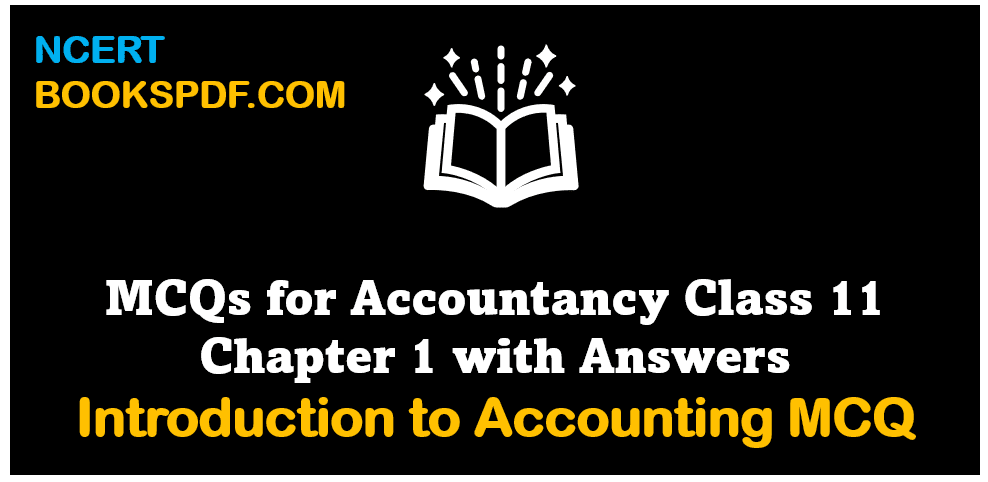MCQs for Accountancy Class 11 with Answers Chapter 1 Introduction to Accounting is based on the most recent CBSE syllabus. All multiple choice questions have been created with solutions and based on the pattern predicted in upcoming board exams. Our team of top accountancy teachers has created MCQs Chapter 1 Introduction to Accounting.
Q1.Which qualitative characteristics of accounting information is reflected when accounting information is clearly presented?
(1) Relevance
(2) Understandability
(3) Reliability
(4) Comparability
Answer
Understandability
Q2.Which of the following is not a business transaction?
(1) Purchase of goods for resale amounted to Rs. 50,000
(2) Paid salaries and wages amounted to Rs. 10,000
(3) Paid rent for office premises Rs. 5,000
(4) Purchased a LCD for personal use
Answer
Purchased a LCD for personal use
Q3.Which is the last step of accounting as a process of information?
(1) Preparation of summaries in the form of financial statements
(2) Recording of data in the books of accounts
(3) Analysis and interpretation of information
(4) Communication of information
Answer
Communication of information
Q4.Use of common unit of measurement and common format of reporting promotes
(1) Understandability
(2) Comparability
(3) Reliability
(4) Relevance
Answer
Comparability
Q5.The process of recording, classifying and summarizing all business transactions in order to know the financial result is called –
(1)Accounting
(2) Book – keeping
(3) None of these.
(4) Journalizing
Answer
Accounting
Q6.The person, firm or institution who does not pay the price in cash for the goods purchased or the services received is called-
(1) Proprietor
(2) Creditor
(3)None of these.
(4) Debtor
Answer
Debtor
Q7.The long term assets that have no physical existence but are rights that have value is known as
(1)Fixed assets
(2)Current assets
(3)Investments
(4)Intangible assets
Answer
Intangible assets
Q8.The debts which are to be repaid within a short period (year or less) are known as
(1)Fixed liabilities
(2)Current liabilities
(3)All of the above
(4)Contingent liabilities
Answer
Current liabilities
Q9.The assets that can be converted into cash within a short period (i.e. 1 year or less) are known as
(1)Fixed assets
(2)Current assets
(3)Investments
(4)Intangible assets
Answer
Current assets
Q10.Purchases refers to the buying of
(1)Stationery for office use
(2) Assets for the factory
(3) Goods of resale
(4) Investment
Answer
Goods of resale
Q11.Promise to pay a certain amount is called
(1) Account Payable
(2) Notes Payable
(3) Amount Payable
(4) Discount Payable
Answer
Notes Payable
Q12.Patents, Copyrights and Trademarks are
(1)Fixed assets
(2)Current assets
(3)Investments
(4)Intangible assets
Answer
Intangible assets
Q13.Nominal Accounts are related to:
(1)Assets and Liabilities.
(2) Expenses and Revenue.
(3) Debtors and Creditors.
(4) None of these.
Answer
Expenses and Revenue.
Q14.Modern system of bookkeeping is
(1)Single entry system
(2) Double entry system
(3) British system
(4) None of these
Answer
Double entry system
Q15.Goodwill is an
(1)Tangible Asset.
(2) Intangible Asset.
(3) Current Asset.
(4) Fictitious Asset.
Answer
Intangible Asset.
Q16.Goods taken by the proprietor for personal use is
(1) Sale.
(2) Drawings.
(3) Purchase.
(4) None of these.
Answer
Drawings.
Q17.Deepti wants to buy a building for her business today. Which of the following is the relevant data for his decision?
(1) Building cost details of 2003
(2) Similar business acquired the required building in 2000 for Rs. 10,00,000
(3) Similar building cost in August, 2005 Rs. 25,00,000
(4) Building cost details of 1998
Answer
Similar business acquired the required building in 2000 for Rs. 10,00,000
Q18.Debit means
(1) an increase in asset.
(2) an increase in liability.
(3) an increase in the proprietor’s equity.
(4) a decrease in asset.
Answer
an increase in asset.
Q19.Cash, goods or assets invested by the proprietor in the business for earning profit is called-
(1) Capital
(2) Profit
(3) None of these.
(4) Fixed assets
Answer
Capital
Q20.Book – keeping is-
(1) A science
(2) An art
(3) None of these.
(4) An art and science both
Answer
An art and science both
Q21.Bank account is a
(1) Personal Account.
(2) Real Account,
(3) Nominal Account.
(4) None of these.
Answer
Personal Account.
Q22.Accounting provides information on
(1)Company’s tax liability for a particular year
(2)Cost and income for managers
(3)All of the above
(4)Financial conditions of an institutions
Answer
All of the above
